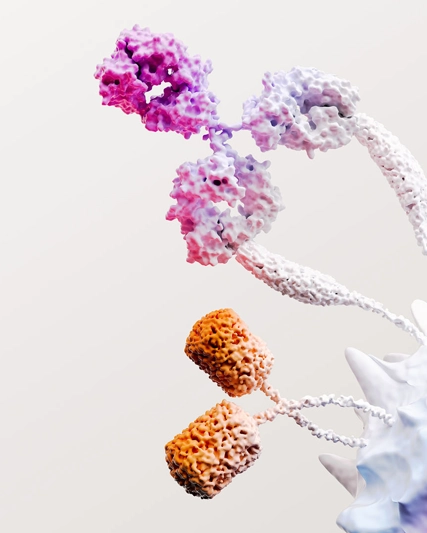Zejula (niraparib) shows durable and sustained long-term progression-free survival benefit in the PRIMA study of first-line platinum-responsive advanced ovarian cancer
Issued: London, UK
For media and investors only
-
HRd patients treated with Zejula were estimated to be more than twice as likely free of progression or death at four years as compared to placebo
-
Zejula maintained a clinically meaningful PFS benefit in newly diagnosed patients who were at high risk of early progression
GSK plc (LSE/NYSE: GSK) today announced long-term data from the phase III PRIMA (ENGOT-OV26/GOG-3012) study showing Zejula (niraparib) maintained a sustained and clinically meaningful progression-free survival (PFS) benefit as a maintenance therapy in patients with first-line ovarian cancer following a response to platinum-based chemotherapy. Importantly, this benefit was sustained across all biomarker subgroups, including BRCAm, HRd and HRp. Results from the updated efficacy analysis will be presented on 11 September at the 2022 European Society for Medical Oncology (ESMO) Annual Meeting (9-13 September). After a median three and a half years follow up, this ad hoc analysis showed:
- In the HRd population, Zejulamaintained a clinically significant risk reduction of progression or death of 48% compared to placebo (HR 0.52; 95% CI, (0.40–0.68); p<0.0001). The estimated probability of no progressive disease or death at four years was 38% for Zejula vs 17% for placebo, respectively. <
- Zejula maintained a durable PFS benefit in the overall population (HR 0.66; 95% CI, (0.56–0.79); p<0.0001).The estimated probability of no progressive disease or death at four years in the overall population was 24% for Zejula vs 14% for placebo, respectively.
- The HRp population also demonstrated a clinically meaningful reduction in the risk of progression or death by 35% compared to placebo (HR 0.65; 95% CI, (0.49–0.87); p<0.0038).
- Overall survival data are not yet mature based on the prespecified analysis plan.
Hesham Abdullah, SVP, Global Head of Oncology Development, GSK said: “Patients can face a high risk of recurrence when diagnosed with late-stage ovarian cancer. The updated analysis of this study shows that Zejula can help patients potentially achieve a long-term remission.” Zejula’s safety profile remained consistent with the primary analysis and no new safety signals were identified. The most common grade three or higher adverse events with Zejula included thrombocytopenia (40%), anaemia (32%), and neutropenia (21%). Long-term monotherapy treatment with Zejula is associated with a low rate of discontinuation due to adverse events, a potential factor in achieving sustained therapeutic benefit. Long-term tolerability data on the individualised starting dose will be presented. Dr Antonio Gonzalez-Martin, Primary Investigator for PRIMA and Director, Department of Medical Oncology, Clinica Universidad de Navarra, said: “This pivotal study provides evidence that patients treated with niraparib maintenance therapy after first-line platinum-based chemotherapy can achieve sustained progression-free survival and maintain remission over time, which is critically important in the management of advanced ovarian cancer, and particularly reassuring for those at high-risk of recurrence. The long-term results not only show the ongoing benefit of niraparib for our trial participants, but offer hope for the future of patients with advanced ovarian cancer.” Zejula is the only once-daily oral monotherapy maintenance treatment approved in the US and the European Union (EU) for patients with first-line platinum-responsive advanced ovarian cancer regardless of biomarker status. About ovarian cancer Ovarian cancer is the 8th most common cancer in women worldwide.[1] Despite high response rates to platinum-based chemotherapy in the front-line setting, approximately 85% of patients will experience disease recurrence.[2] Once the disease recurs, it is rarely curable, with decreasing time intervals to each subsequent recurrence. About Zejula (niraparib) Niraparib is an oral, once-daily PARP inhibitor that is currently being evaluated in multiple pivotal trials. GSK is building a robust niraparib clinical development programme by assessing activity across multiple tumour types and by evaluating several potential combinations of niraparib with other therapeutics. The ongoing development programme for niraparib includes several combination studies. About PRIMA PRIMA is a double-blind, randomised phase III study designed to evaluate niraparib versus placebo in first-line Stage III or IV ovarian cancer patients. The study assessed the efficacy of niraparib as maintenance treatment, as measured by progression-free survival. Patients with a response to first-line platinum-based chemotherapy were randomised 2:1 to niraparib or placebo. The trial was amended to include an individualised niraparib starting dose of 200 mg once-daily in patients with baseline weight <77kg and/or platelet count <150K/μL and 300 mg in all other patients. Important Information for Zejula in the EU Indication Zejula is indicated as monotherapy for the maintenance treatment of adult patients with advanced epithelial (FIGO Stages III and IV) high-grade ovarian, fallopian tube or primary peritoneal cancer who are in response (complete or partial) following completion of first-line platinum-based chemotherapy. Refer to the Zejula Prescribing Information for a full list of adverse events and the complete important safety information in the EU. About GSK GSK is a global biopharma company with a purpose to unite science, technology, and talent to get ahead of disease together. Find out more at gsk.com/company Cautionary statement regarding forward-looking statements GSK cautions investors that any forward-looking statements or projections made by GSK, including those made in this announcement, are subject to risks and uncertainties that may cause actual results to differ materially from those projected. Such factors include, but are not limited to, those described in the Company's Annual Report on Form 20-F for 2021, GSK’s Q2 Results for 2022 and any impacts of the COVID-19 pandemic. References [1] Worldwide Cancer Data. World Cancer Research Fund. https://www.wcrf.org/dietandcancer/cancer-trends/worldwide-cancer-data. Updated January 10, 2022. Accessed July 2022. [2] Lorusso D, Mancini M, Di Rocco R, Fontanelli R, Raspagliesi F. The role of secondary surgery in recurrent ovarian cancer [published online August 5, 2012]. Int J Surg Oncol. 2012. doi:10.1155/2012/613980. Accessed September 2022.


